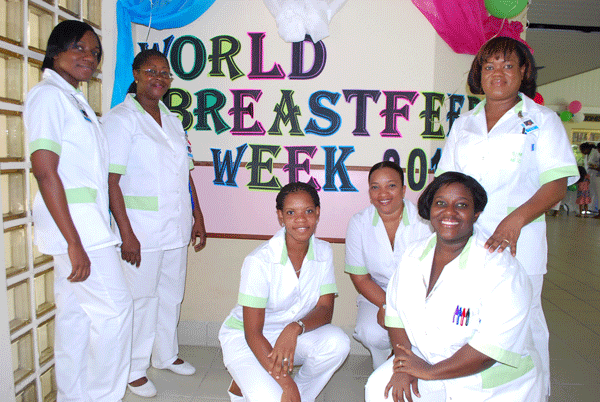 GREAT BAY The Nurses at the OB/GYN and Pediatric wards of the St. Maarten Medical Center is commemorating World Breastfeeding Week (WBW), as supported by the World Health Organization (WHO) and UNICEF.
GREAT BAY The Nurses at the OB/GYN and Pediatric wards of the St. Maarten Medical Center is commemorating World Breastfeeding Week (WBW), as supported by the World Health Organization (WHO) and UNICEF.According to the WHO website, "WBW is celebrated every year from 1 to 7 August in more than 120 countries to encourage breastfeeding and improve the health of babies around the world. It commemorates the Innocenti Declaration made by WHO and UNICEF policy-makers in August 1990 to protect, promote and support breastfeeding."
"Breastfeeding is the best way to provide newborns with the nutrients they need. WHO recommends exclusive breastfeeding until a baby is six months old, and continued breastfeeding with the addition of nutritious complementary foods for up to two years or beyond."
Sheryl Carty-Fleming, Supervisor of the OB/GYN (maternity section), said that the nurses are committed and dedicated in their work and I commend them for a job well done, especially over the last 3 to 4 years.
As nurses at the SMMC, Nurse Carty-Fleming said that we play a vital role in the establishment of breast feeding. We render care to women during their pregnancy, labor, and delivery. We come in contact with mothers and newborns on a daily basis.
Three years ago, we interviewed fathers and men on how they see breast feeding and their thoughts/challenges on this. We concluded that women keep them away because we think they are not interested, so we have to get more men involved in the process. So we have decided that we needed to rejuvenation of our efforts.
Last year we set out to make aware our SMMC colleagues of the importance of breastfeeding from management to our interior care takers.
I would like to thank all that contributed to these efforts, Nurse Carty-Fleming said. Cancy MCRae, Stacy-Ann Violenus, Roslyn Brookson, Naica Arrindell, Mary Liburd, Yvonne Cameron, Fely Mendiola, Holis Parks, Kristine Efenio, and Ariene Tearr.
A committee has been put together and they have come up with several activities that will not only cover the week and month, but also throughout the year. Such activities as: a questionnaire, information sessions, revising breast feeding policy, article and picture contest, and promotional items.
In this regard, she added that an information booth will be in the patio area of the SMMC for the public to visit for more information on breast feeding, from 12 noon to 2pm on August 3rd. There are pamphlets, bookmarks, and other information, including persons on hand to provide the interested persons with information.
The organizing committee pointed out to follow the: Ten Steps to Successful Breastfeeding, namely, every facility providing maternity services and care for newborn infants should:
- Have a written breastfeeding policy that is routinely communicated to all health care staff.
- Train all health care staff in skills necessary to implement this policy.
- Inform all pregnant women about the benefits and management of breastfeeding.
- Help mothers initiate breastfeeding within half an hour of birth.
- Show mothers how to breastfeed, and how to maintain lactation even if they should be separated from their infants.
- Give newborn infants no food or drink other than breast milk, unless medically indicated.
- 7. Practice rooming-in - that is, allows mothers and infants to remain together - 24 hours a day.
- Encourage breastfeeding on demand.
- Give no artificial teats or pacifiers (also called dummies or soothers) to breastfeeding infants.
- Foster the establishment of breastfeeding support groups and refer mothers to them on discharge from the hospital or clinic.









